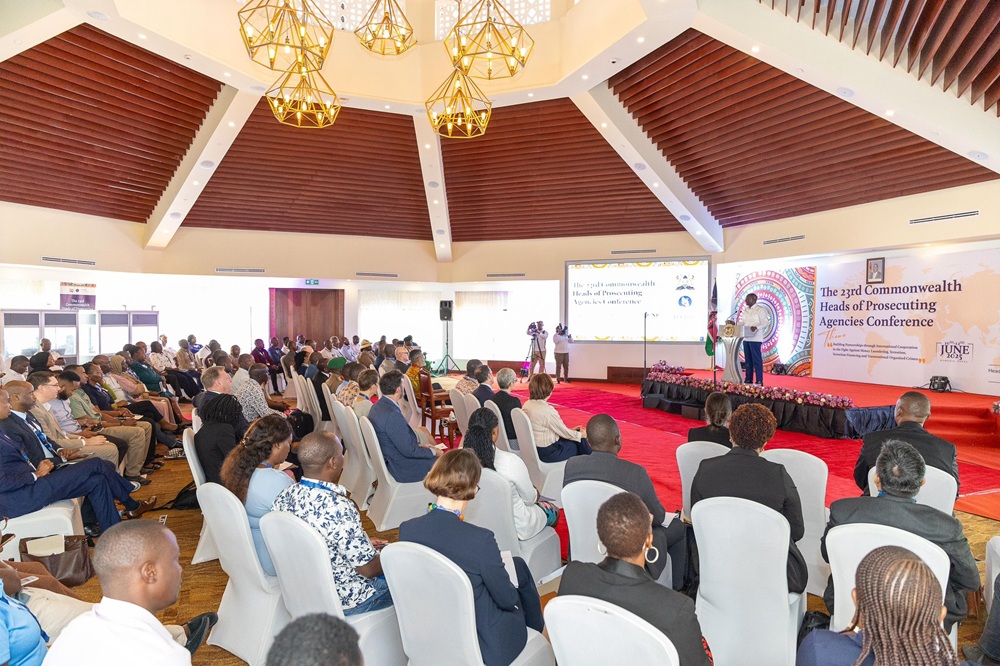
Ruto calls for collaboration to tackle transnational threats
President William Ruto has urged prosecutorial agencies across the globe to develop regional and international mechanisms to collaboratively address complex transnational threats.
The President noted that transnational organised crime continues to grow in scale and complexity, citing money laundering, terrorism, terrorism financing, and human trafficking, that he said pose serious risks to all countries.
He pointed out that the use of complex criminal mechanisms, such as sophisticated encrypted social media platforms and cryptocurrency to finance crime, makes it difficult for any single agency or country to confront these ever-evolving threats in isolation.
“We therefore need greater vigilance, more robust partnerships, and integrated international responses to identify, investigate, and prosecute those behind these crimes,” he said.
“It is through such collaboration between national, regional, and international agencies that we can effectively disrupt and neutralise these threats and blunt their negative impact,” he added.
He made the remarks during the 23rd Commonwealth Heads of Prosecuting Agencies Conference held in Mombasa County.
The theme of the conference was Building Partnerships Through International Cooperation in the Fight Against Money Laundering, Terrorism, Terrorism Financing and Transnational Organised Crimes.
Mombasa Governor Abdullswamad Nassir, Director of Public Prosecutions Renson Ingonga, and other heads of prosecuting agencies from the Commonwealth were present.
The President emphasised that mutual legal assistance and extradition are essential for effective joint investigations, prosecutions, and cross-border information sharing.
“Joint investigations allow for real-time collaboration and pooled expertise, enabling us to dismantle criminal networks more effectively,” he said.
President Ruto also urged the conference to focus on asset tracing, confiscation, and forfeiture to deny criminal enterprises the proceeds of illicit activities, thereby undermining their operations.
He said Kenya is revamping the anti-money laundering and asset forfeiture framework.
“On our part, Kenya is committed to enhancing the resources and capacity of the Office of the Director of Public Prosecutions to lead these efforts regionally and internationally,” he added.
The President also called for the leveraging of technology to support the efficient delivery of justice through the criminal justice system.
He said the government remains committed to upholding the rule of law and advancing a human rights-centred approach to prosecution and the pursuit of justice.
President Ruto said Kenya continues to heighten vigilance, enhance intelligence gathering, and strengthen international cooperation to confront the threat of terrorism in the country.
This, he noted, has resulted in notable progress in bringing perpetrators to justice.
He noted that last month, two individuals were convicted of aiding the DusitD2 attackers, with sentencing set for 19 June 2025.
In the Garissa University case, he said three were found guilty in 2019 and sentenced to life imprisonment and 41 years each.
He added that 24 terrorism-related cases are currently active in court, most involving links to international terror groups.
“These efforts have not only led to successful prosecutions but have also significantly suppressed such attacks and contributed to enhanced national security,” he said.
President Ruto said reforms in the African Union are necessary to build networks that will better leverage opportunities across the continent and more effectively deploy the assets and resources available.
He cited human resources, mineral wealth, and natural resources as key areas to be harnessed in order to improve the quality of life for the people of the continent.
“There is an opportunity within the African Union that as we undertake reforms for the African Union we can better collaborate as countries in this region to see how we can build greater synergy in all spaces,” he said.
The President said the government has undertaken the construction of 2,500 kilometres of roads, housing, markets, and stadia.
The goal, he said, is to transform the country, improve service delivery, and boost infrastructure development.
Mr Ingonga noted that the fight against crime must never compromise the principle of justice and fairness.
